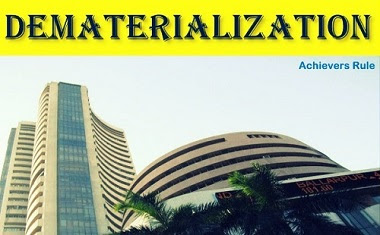
Dematerialization (DEMAT) of securities in India
Introduction:
An investors’ portfolio of paper securities is subject to problem such as mutilation of share certificates, loss of certificates, forged certificates, bad delivery etc. These problems can be taken care of through the medium of ‘Depository’ by providing paperless electronic or dematerialized security transaction.
Dematerialization is a process by which an investor's paper certificates are returned by the company / registrar and are actually destroyed and the equivalent securities are deposited in the electronic form of the investor.
Depository and its Role:
Depository is like a bank, where securities are held in electronic form, scrip’s are collected and receipts and record of the account are given to the investors.
Storage of Dematerialized Shares – Depository:
Depository is a body that is responsible for the protection or maintenance of the investor's safety in the demand or electronic form. India's National Securities Depository Limited (NSDL) and Central Depository Services (India) Limited (CDSL) have two depositories.
Depository Participants (DPs):
DP are shareholders’ representative 9like brokers on SEs) and provide a link between the depository and the client. The transactions for demat stock, with a depository are carried by opening an account with and through the depository participant.
Rematerialisation:
When the electronic holdings are converted back into paper certificates by printing new certificates with a new range of certificate numbers, the process is called rematerialisation.
Benefit:
The system take care of the problems of bad deliveries, lost share certificates, postal delays in receiving securities and transfer related problems, reduction in the incidence of fake certificates and forged transfer deeds. It facilitates seedier settlements and increased efficiency at lower costs.
Advantages of Demat:
Trading in demat format is beneficial for investors, brokers and companies. This reduces the risk of sharing of shares from the investor's point of view. This is useful for brokers because it reduces the risk of delayed settlement and increase profits due to increased participation.
From the point of view of the issuing company, the demat format is published, papers are not involved in reducing the value of the new issue. It is still managed by companies in the dematerialized format, when the issues and efficiency of the issue are maintained.
Basic Services Demat Account (BSDA):
Eligibility Criteria – The account of any individual or only demo account where he or she is the only holder, has proposed that the value of the securities in the account does not exceed every year Rs. 2 lakh at any time.
A person may have the only BSDA of his / her name in all repositories.
Charges – Annual Maintenance Charge (MAC) must be on the basis of a slab; if the holding value is–
- Up to Rs. 50, 000 there will be NIL AMC and
- Up to Rs. 50, 000 to Rs. 2, 00, 000 – up to Rs. 100.
Transaction Statement – The transaction statement will be sent to the BO at the end of each quarter.
Holding Statement – An annual physical statement will be sent to the beneficiary owner (BO) statement of account with any transaction and nickel balance, and an annual statement for the remaining accounts will be sent in electronic or physical form for by BO.
Charges for statements – The electronic statement will be provided free of charge.










Post a Comment